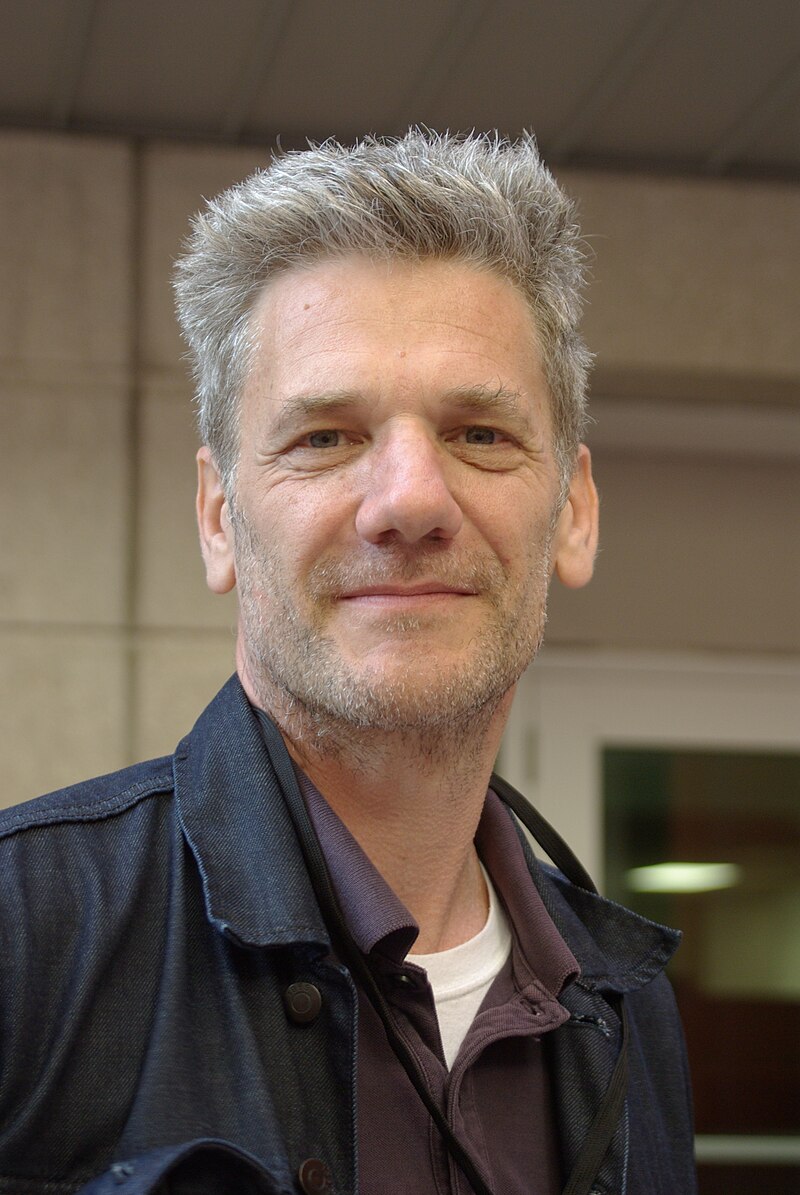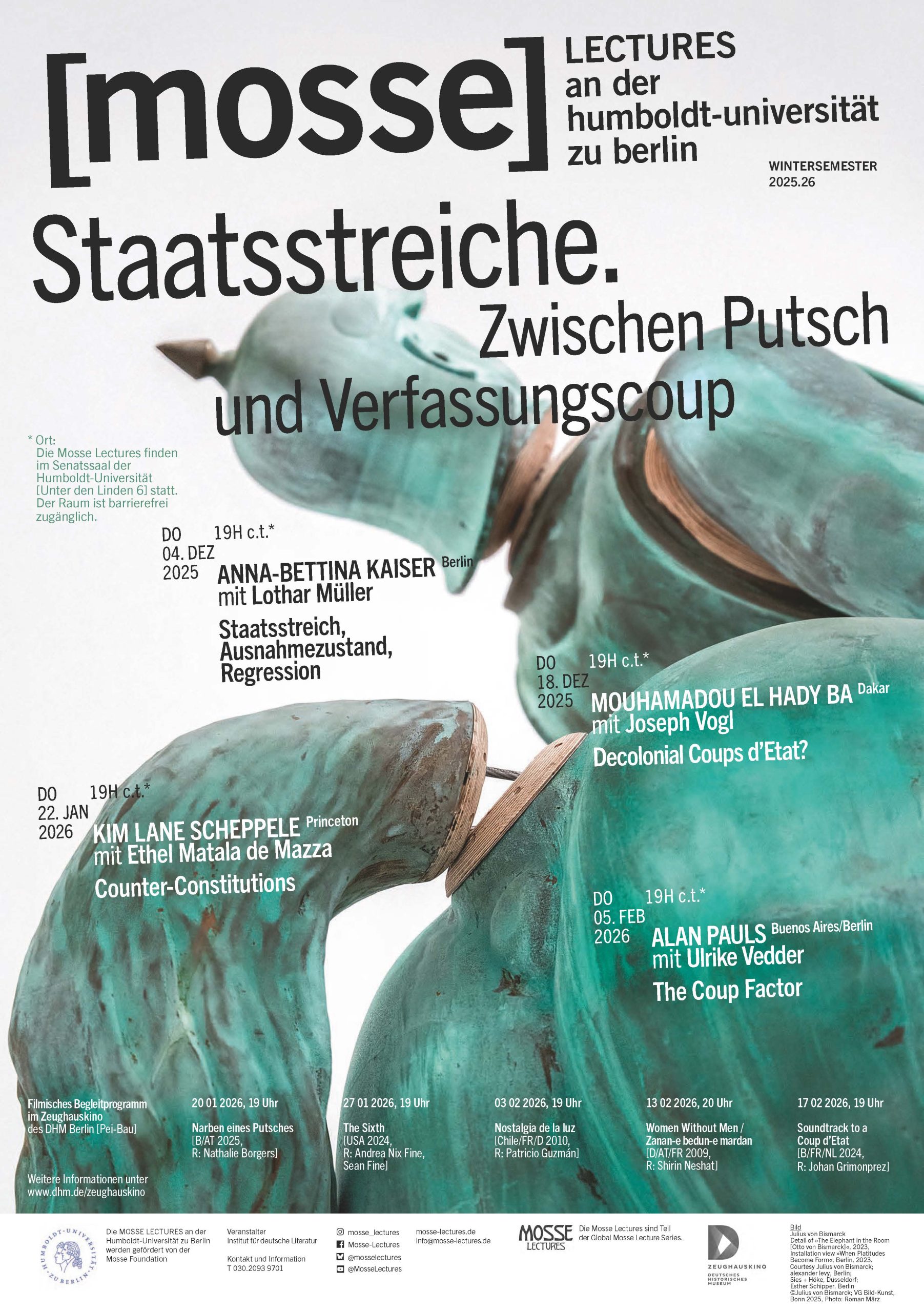Humboldt University Mosse Lecture
The Coup Factor
Alan Pauls
Senatssaal of Humboldt University
February 5, 2026 19:15 CET
With Ulrike Vedder
The lecture will be held in English.
Lecture Series Description: Writing at the beginning of the 20th century, Max Weber observed that, owing to its internally rationalized structure, the modern bureaucratic state apparatus has replaced »revolutions« with »coups d’état.« This observation remains as relevant today as it was at the time. Moreover, we are currently witnessing another significant change. In Europe and the United States, the classic coup d’état is being replaced by the gradual transformation of the constitution, characterized by its erosion from within and the dynamic breakdown of the rule of law and the separation of powers, driven by elected governments. »Democratic backsliding today begins at the ballot box,« write Steven Levitsky and Daniel Ziblatt in ›How Democracies Die‹ [2018]. At the same time, there are still military coups, as seen in West Africa. The Mosse Lectures aim to shed light on the forms of coups d’état in historical and systematic terms, examining the accompanying cultural shifts in power. What significance does the coup d’état have in times of a general »return to authoritarianism« and a re-emergence of traditional masculinity? What role does the rise of the tech elite play in the weakening of democratic institutions? What new insights can a postcolonial perspective on coups d’état offer? Can the undermining of democracies be curbed in time by identifying and visualising patterns? The Mosse Lectures address these questions, focusing on Europe, the United States, West Africa, and South America.
The complex interplay of visibility in politics can be part of the performance of coups d’état, which, as acts of seizing power, exhibit a unique form of theatricality. From coups captured on camera to the exploitation of social media to undermine the separation of powers, autocratic takeovers frequently resemble political spectacles. It is therefore unsurprising that they have been recounted and filmed so often. This semester’s Mosse Lectures will be complemented by an accompanying program on coups in film, which will be shown on five evenings in January and February 2026, in collaboration with the Zeughauskino at Deutsches Historisches Museum in Berlin.
PLEASE NOTE: The Mosse Lectures take place in the Senatssaal of Humboldt University [Unter den Linden 6]. The room is barrier-free.
Der moderne bürokratische Staatsapparat hat, so notierte Max Weber zu Beginn des 20. Jahrhunderts, »durch seine innere durchrationalisierte Struktur […] an die Stelle der ›Revolutionen‹ die ›Staatsstreiche‹ gesetzt«. Dieser Befund hat an Aktualität nichts verloren. Mehr noch erleben wir gegenwärtig eine weitere folgenreiche Verschiebung. An die Stelle des klassischen Putsches tritt in Europa wie in den Vereinigten Staaten die sukzessive Transformation der Verfassung in Form ihrer Aushöhlung von innen, die von gewählten Regierungen betriebene dynamische Erosion des Rechtsstaats und der Gewaltenteilung insgesamt. »Der demokratische Rückschritt beginnt heute an der Wahlurne, « schreiben Steven Levitsky und Daniel Ziblatt in ›How Democracies Die‹ [2018]. Zugleich gibt es, etwa in Westafrika, aktuelle Varianten von Militärputschen. Die Mosse Lectures wollen die Formen des Staatsstreichs historisch-systematisch beleuchten und nach den kulturellen Machtverschiebungen fragen, die mit ihm einhergehen. Welche Bedeutung kommt dem Staatsstreich in Zeiten einer allgemeinen »Wiederkehr des Autoritären« und einer Rekultivierung von Männlichkeit zu? Welche Rolle spielt der Aufstieg der Tech-Elite für die Schwächung demokratischer Institutionen? Welche neuen Perspektiven kann ein postkolonialer Blick auf Staatsstreiche eröffnen? Und lässt sich die Aushebelung von Demokratien durch die Identifizierung und Sichtbarmachung von Mustern rechtzeitig eindämmen? Die Mosse Lectures stellen diese Fragen mit Blick auf Europa, die Vereinigten Staaten, Westafrika und Südamerika.
Das komplexe Spiel mit der Sichtbarkeit des Politischen kann Teil der Performanz von Staatsstreichen sein, die als Inszenierungen der Machteroberung eine ganz eigene Form der Theatralität aufweisen. Vom Putsch vor laufender Kamera bis hin zur Indienstnahme der sozialen Medien für Angriffe auf die Gewaltenteilung: Autokratische Machtübernahmen gleichen nicht selten einem politischen Schauspiel. Es ist nicht verwunderlich, dass sie so oft erzählt und verfilmt wurden. Ergänzt werden die Mosse Lectures in diesem Semester durch ein Begleitprogramm zu Staatsstreichen im Film, das in Kooperation mit dem Zeughauskino am Deutschen Historischen Museum in Berlin an fünf Abenden im Januar und Februar 2026 zu sehen sein wird.
HINWEIS: Die Mosse Lectures finden im Senatssaal der Humboldt-Universität [Unter den Linden 6] statt. Der Raum ist barrierefrei zugänglich.
 Alan Pauls: Novelist, screenwriter, essayist, and critic; Pauls studied literature at the Universidad de Buenos Aires and later worked there as a professor of literary theory. He was also a visiting professor at Princeton University and taught creative writing at the Universidad de Tres de Febrero [Buenos Aires] and New York University. He is the founder of the magazine Lecturas críticas and worked as an editor for the daily newspaper Página/12. His novel »El pasado« [2003; English: »The Past«, 2009] won the Spanish Herralde Literary Prize and was made into a film by Héctor Babenco. With »Historia del llanto« [2007; A History of Crying, not translated], »Historia del pelo« [2010; A History of Hair, not translated] and »Historia del dinero« [2013; »A History of Money«, 2015] between 2007 and 2013, he created a trilogy about the 1970s in Argentina and the history of the Argentine dictatorship. Pauls has been living and working in Berlin since 2019.
Alan Pauls: Novelist, screenwriter, essayist, and critic; Pauls studied literature at the Universidad de Buenos Aires and later worked there as a professor of literary theory. He was also a visiting professor at Princeton University and taught creative writing at the Universidad de Tres de Febrero [Buenos Aires] and New York University. He is the founder of the magazine Lecturas críticas and worked as an editor for the daily newspaper Página/12. His novel »El pasado« [2003; English: »The Past«, 2009] won the Spanish Herralde Literary Prize and was made into a film by Héctor Babenco. With »Historia del llanto« [2007; A History of Crying, not translated], »Historia del pelo« [2010; A History of Hair, not translated] and »Historia del dinero« [2013; »A History of Money«, 2015] between 2007 and 2013, he created a trilogy about the 1970s in Argentina and the history of the Argentine dictatorship. Pauls has been living and working in Berlin since 2019.
Roman- & Drehbuchautor, Essayist und Kritiker; Pauls studierte Literaturwissenschaften an der Universidad de Buenos Aires, wo er später als Professor für Literaturtheorie tätig wurde. Darüber hinaus war er Gastprofessor an der Princeton University und unterrichtete Kreatives Schreiben an der Universidad de Tres de Febrero [Buenos Aires] und der New York University. Er ist Gründer der Zeitschrift Lecturas críticas und arbeitete als Redakteur für die Tageszeitung Página/12. Sein Roman »El pasado« [2003; dt. »Die Vergangenheit«, 2009] gewann den spanischen Literaturpreis Herralde und wurde von Héctor Babenco verfilmt. Mit »Historia del llanto« [2007; dt. »Geschichte der Tränen«, 2010], »Historia del pelo« [2010; dt. »Geschichte der Haare«, 2012] und »Historia del dinero« [2013; dt. »Geschichte des Geldes«, 2016] entstand zwischen 2007 und 2013 eine Trilogie über die 1970er Jahre in Argentinien und die Geschichte der argentinischen Diktatur. Pauls lebt und arbeitet seit 2019 in Berlin.

